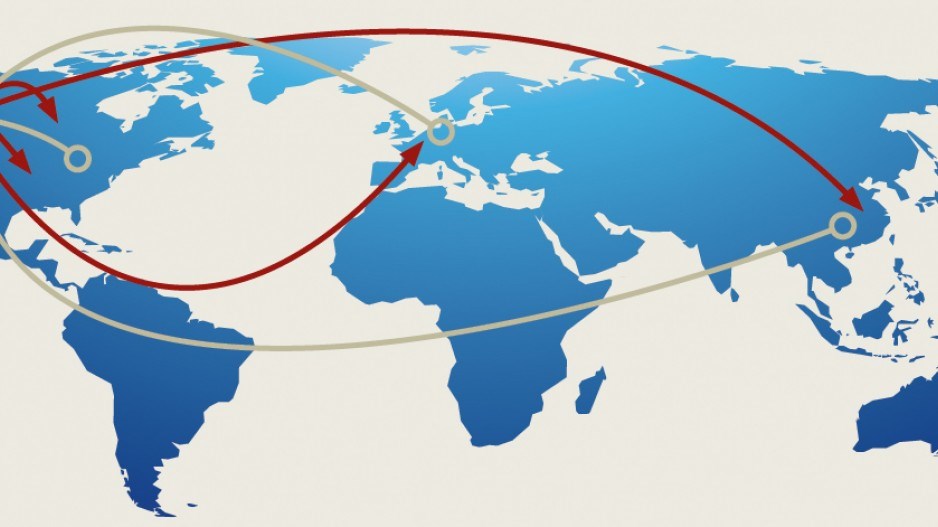Seoul, South Korea – B.C. businesses need to do more to integrate themselves into increasingly powerful regional trade networks as manufacturing chains shift away from a global goods flow to a more regionalized model, economists and industry officials say. That’s because the global flow of information is starting to displace the flow of materials and manufactured goods.
The evolving shift in trade is reducing the size of the region required in supply chain networks and creating demand for data that requires more flexibility from companies serving specific markets. That new model – dubbed “Industry 4.0” by officials in countries such as the United States, Germany and South Korea – calls for the injection of data analysis into every step along the business value chain, from material procurement and manufacturing to the delivery of goods.
It requires countries like Canada or South Korea – equally “middle power” economies dealing with gigantic neighbours like the United States and China – to be on the ground in regional chains more than ever before, one Korean official said.
“It means that manufacturing in one country cannot survive by itself,” said Bae Kyounghan, vice-president of the Korea Smart Factory Foundation, a government-backed effort to promote the new information-driven economic model. “You have to work with other markets, not just the traditional big players. Smart factories are a huge trend that everybody is facing, and the basic idea is that everyone shares in the information that new technology generates … and applies it to the situation in your own market.”
That’s the challenge facing Canadian businesses, especially small and medium-sized enterprises, said Andreas Schotter, professor at the University of Western Ontario’s Ivey Business School and a former business executive in China.
He noted that, in light of more protectionism from markets like the United States and more populist nationalism in markets like China, B.C. businesses need to integrate with as many networks in other regions of the world as possible, lest Canada be left out when production chains inevitably shrink.
“As technology advances, it’s no longer necessary to move big products around the world on [these] integrated value and manufacturing chains,” Schotter said. “There are still integrated value chains, but they are not flowing globally anymore. They are flowing regionally. So Canada needs to think strategically about how we connect with all the regions.”
A key part of that, one that Schotter noted Canada needs to improve upon, is the protection of Canadian businesses from acquisition, because they are ultimately the engines for allowing Canada to pursue regional opportunities around the world – instead of becoming passive acquisition/expansion targets for foreign firms.
He added that Canada’s multicultural society can be an advantage for Canadian companies’ advances into regional networks – but only if that human resource is used correctly.
“It seems that everyone coming to Canada is happy to be here, but how about that diaspora reconnecting [with their countries of origin] and creating opportunities for Canada at every level?”
The latest statistics appear to support the shift in global trade trends. According to the World Trade Organization (WTO), global merchandise trade volumes grew by a paltry 1.3% in 2016, and the International Monetary Fund figure for global export volume growth rate from 2008 to 2015 sits at only 2.9% – less than half of the figure recorded from 2001 to 2008. The WTO projection for this year’s growth rate is 2.4% but it’s placed in a range of 1.8% to 3.6% due to uncertainties with rising protectionist policies.
One of the hardest-hit industries by this shift is the shipping industry, where most major players have seen declining revenue since 2008. But ironically, one of the key companies with Vancouver ties heeding economists’ message of integrating with foreign regional markets is Subsea Global Solutions, which develops products and repair services for ships.
Brian Devlin, area manager of Subsea’s Asia/Oceania territory, was based in Vancouver prior to moving to Seoul six years ago. Devlin said the company is aggressively trying to get its new in-water hull-cleaning technology – a significant portion of which was developed in Vancouver – approved at two major port authorities outside B.C.: Busan, South Korea’s largest port and a major shipping hub, and Long Beach, California.
The effort comes, Devlin said, as the company identified the same trend listed by officials on the regionalization of global trade. As such, Subsea wanted to be closer to where the shipping business is growing, and he said that meant looking outside Vancouver.
Devlin said the plan is to pursue approvals in Hong Kong, China and Singapore once Subsea gets the go-ahead in South Korea, which would integrate the company deeper into the regional shipping trade. The potential, he said, could increase the company’s Asian business by 300% year-over-year and double its Korean staff of 16.
“The Asia market, basically, has the quantity of business in the industry,” Devlin said at Invest Korea, an event held by South Korea’s trade promotion agency, KOTRA, in Seoul in early November.
“In Vancouver, the coming and going of big vessels when compared to Busan is practically nothing. Some of the largest shipping firms are here in Korea, and we’ve been working on this for five years.”
(Note: Some interviews conducted for this story were completed at Invest Korea in Seoul, for which the reporter’s airfare and accommodations were provided by KOTRA.)




